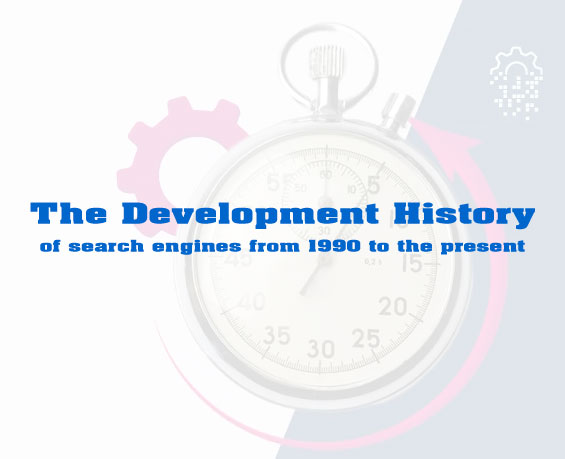The development history of search engines from 1990 to the present
When Did SEO Begin?
Search Engine Optimization (SEO) started in the early days of the internet and evolved alongside search engines. The history of SEO can be divided into the following stages:
1. The Early Days of the Internet (1990s)
- 1991: The World Wide Web (WWW) was introduced, and the first websites began to appear. However, during this period, the internet was largely unstructured, making it difficult for users to find information.
- 1994: One of the first search engines, Yahoo!, was launched. Initially, it was a human-curated directory of websites. Later, automated search engines like AltaVista and Lycos emerged, allowing users to find information using keywords.
2. The Rise of Google (1998)
- 1998: Google was founded by Larry Page and Sergey Brin. It revolutionized search by introducing PageRank, an algorithm that ranked websites based on the number and quality of links pointing to them. This innovation helped Google deliver more relevant search results than previous search engines.
- SEO Begins to Emerge: As Google and other search engines gained popularity, businesses realized the importance of optimizing their websites to rank higher in search results. SEO started becoming an industry as webmasters and experts explored ways to improve website rankings.
3. The Growth of SEO (2000s)
- 2000: Major search engines began using more complex algorithms to rank websites, making SEO a specialized field. Google's first algorithms, like PageRank and the Florida Update (2003), significantly impacted SEO strategies.
- 2004: Google introduced AdWords, opening the online advertising market and shifting focus from organic SEO to paid SEO (PPC – Pay Per Click).
- 2005: SEO became a professional industry, with companies and experts helping businesses improve their search rankings.
4. SEO Evolution and Algorithm Updates (2010s)
- 2011: Google launched the Panda algorithm, which lowered rankings for low-quality content websites and prioritized original, valuable content. This marked a shift from keyword stuffing to content quality.
- 2012: Google introduced the Penguin Update, targeting unnatural SEO tactics like spammy link-building to manipulate rankings.
- 2015: The Mobile-Friendly Update was released, making mobile-friendly websites more important for search rankings. This was also when Google began emphasizing user experience and page load speed.
5. SEO Today and the Future (2020s and Beyond)
- 2020s: SEO continues to evolve with algorithms like BERT (Bidirectional Encoder Representations from Transformers), enabling Google to understand complex search queries and semantics. Today, SEO is not just about keywords but also about content quality, user experience, and technical factors such as page speed, security, and mobile-friendliness.
- Future SEO trends focus on voice search, image search, and the growing role of AI in improving search results.
SEO began in the 1990s with the emergence of the first search engines but truly took off after Google's launch in 1998. Today, Viet SEO emphasizes that SEO is no longer just a keyword-ranking strategy but an essential part of businesses' overall digital marketing efforts, focusing on content quality, user experience, and long-term growth.
Who Invented the Term "SEO"?
The term Search Engine Optimization (SEO) was not coined by a single person but evolved alongside the internet and search engines. However, some key individuals played a significant role in popularizing and shaping SEO as a profession:
- Danny Sullivan – A major influencer in the SEO industry, he founded Search Engine Watch in 1997, one of the first SEO resources. He also launched Search Engine Strategies, a major SEO conference. While he didn't "invent" the term SEO, he helped educate and promote SEO in the early internet days.
- Bruce Clay – A pioneer in the SEO industry, he founded Bruce Clay Inc. and authored one of the first books on SEO. In the 1990s, he began offering SEO services and was among the first to develop effective SEO strategies.
- The SEO Community – As search engines like Google, Yahoo!, and Bing became more popular, webmasters and digital marketers realized they could optimize websites to rank higher. Over time, SEO became a recognized industry term.
Thus, SEO as a term and practice emerged organically as the internet and search engines developed.
SEO and the Rise of Google - Perspective from VietSEO
SEO and Google's rise are deeply interconnected. Google's dominance in search has not only changed how we find information but also how SEO strategies are executed. Here’s how SEO and Google's growth are linked:
1. The Beginnings of Google and SEO
- 1998: Google was founded by Larry Page and Sergey Brin to improve online search results. Unlike previous search engines, Google used the PageRank algorithm, which ranked pages based on the quantity and quality of links pointing to them.
- As Google became more popular, businesses realized they needed to optimize their websites for better rankings, leading to a growing demand for SEO.
2. Google's Algorithm Development
- PageRank (1998): Initially, Google ranked pages based on links, encouraging link-building as a key SEO strategy.
- Panda (2011): Penalized low-quality, duplicate, or thin content, shifting SEO focus to high-quality, valuable content.
- Penguin (2012): Targeted spammy and unnatural link-building practices, promoting organic, high-quality backlinks.
- RankBrain (2015): Introduced machine learning to improve search accuracy and relevance based on query context.
3. The Evolution of SEO in the Google Era
- SEO became a professional industry as businesses sought expertise to optimize for Google’s search results.
- Mobile-first indexing forced websites to prioritize mobile-friendly experiences, shaping modern SEO.
- User experience (UX) factors like page speed, security (HTTPS), and content relevance became critical for rankings.
4. SEO and the Future of Search
- Voice search and AI – The rise of voice assistants like Google Assistant, Alexa, and Siri is changing search behavior, requiring SEO to adapt to conversational and long-tail queries.
- AI-driven SEO – Google’s machine learning algorithms will continue refining search results, pushing SEO towards semantic search and user intent optimization.
Viet SEO helps businesses stay aligned with Google's evolving standards, ensuring lasting visibility and growth in the digital landscape.
How Has SEO Evolved?
SEO has grown from basic keyword optimization to a complex field influenced by search algorithms, user behavior, and digital marketing trends. Here’s an overview of its evolution:
1. Early SEO (1990s – 2000s)
- Search engines ranked pages based on keywords and basic link structures.
- Google's PageRank algorithm changed SEO by prioritizing backlinks and relevance.
- Early tactics included keyword stuffing and meta tag manipulation.
2. SEO Becomes a Profession (2000s – 2010s)
- Google’s dominance led to sophisticated ranking algorithms.
- SEO shifted from keyword tricks to structured site architecture and link-building.
- Major updates like Panda, Penguin, and Hummingbird emphasized content quality and natural links.
3. Modern SEO (2010s – Present)
- Google prioritized mobile optimization, UX, and AI-driven search.
- Semantic search replaced keyword-heavy tactics with intent-based content strategies.
- AI (BERT, RankBrain) transformed SEO from technical optimization to user-focused, high-quality content creation.
4. The Future of SEO
- Voice and visual search will reshape SEO with longer, conversational queries.
- AI-driven content analysis and ranking will make SEO more advanced.
- SEO will be increasingly integrated with digital branding and user experience.
SEO’s history shows a clear trend: from technical tricks to high-quality content and user experience. Vietnam SEO emphasizes that future SEO will continue evolving alongside AI, mobile search, and personalization - requiring brands to stay adaptive, user-focused, and strategically innovative.



